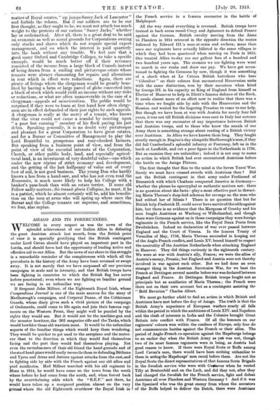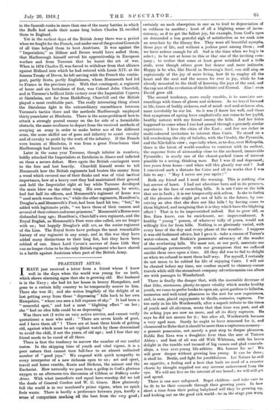ASIAGO AND ITS FORERUNNERS.
WELCOME in every respect as was the news of the splendid achievement of our Italian Allies in defeating the great Austrian attack last month, from the British point of view it is specially gratifying that the British contingent under Lord Cavan should have played an important part in the battle, and should have had the opportunity of lending active and effective aid to our Allies. But the news of our share in this struggle is a remarkable reminder of the completeness with which all the precedents in the history of the Army have been reversed or swept away. It is not merely that we have surpassed all our previous campaigns in scale and in intensity, and that British troops have been fighting in countries to which the British flag has never before penetrated; even where we are fighting on familiar ground we are facing in an unfamiliar way.
If Sergeant John Millner, of the Eighteenth Royal Irish, whose Compendious Journal is one of the main sources for the story of Marlborough's campaigns, and Corporal Deane, of the Coldstream Guards, whose diary gives such a vivid picture of the campaign of Oudenarde, could come to life again and join their famous regi- ments on the Western Front, they might well be puzzled by the sights they would see. But it would not be the machine-gun and the monster howitzer, the -303 magazine rifle and the Tanks, which would bewilder those old warriors most. It would be the unfamiliar aspects of the familiar things which would keep them wondering. They would be quicker to get used to the aeroplane and the motor- car thari to the direction in which they would find themselves facing and the part they would find themselves playing. Not even the recrudescence of their old friend the hand-grenade and of the steel head-piecewould easily reconcile them to defending Bethune and Ypres and Arras and Amiens against attacks from the east, and to fighting side by side with the French against our old allies and paid auxiliaries. Had Millner marched with his old regiment to Mons in 1914, he would have come on the town from the south where before he had come from the north, and, when forced back by the overwhelming odds which the "B.E.F." met there, he would have taken up a rearguard position almost on the very ground where the old Eighteenth overthrew the Royal Irish in
the French service in a famous encounter in the battle of Malplaquet.
All the way round everything is reversed. British troops have trained in back areas round Crecy and Aginoourt to defend France
against the German. British cavalry moving from the Aisne to Flanders in 1914 retraced in the opposite direction the routes followed by Edward III.'s men-at-arms and archers; more than once our regiments have actually billeted in the same villages in which they had been quartered when moving on Paris in 1815. Our trusted Allies to-day are our gallant foes of a hundred and two hundred years ago. The enemies we are fighting were wont to march in our ranks and draw our pay. We have got accus- tomed to fighting the Germans by now, though it was something of a shock when at Le Cateau British battalions who bear " Gibraltar " on their colours first encountered Hanoverian units with the same distinction, won by their ancestors when hired by George III. in his capacity as King of England from himself as Elector of Hanover to help in Eliott's famous defence of the Rock. It needs almost more of an effort now to realize that there was a time when we fought side by side with the Hanoverian and the Hessian and waited for the lingering Prussian to come to our help. But though we have been at war with Austria for nearly four full years, it was not till British divisions were sent to Italy last autumn that there was any encounter of any importance between British and Austrian troops, and to those who know the annals of our Army there is something strange about reading of a British victory over Austrians. As Allies we have known them long. They fought stoutly enough in Eugene's day alongside Marlborough's men, if they did fail Cumberland's splendid infantry at Fontenoy, left us in the lurch at Lauffeldt, and cut a poor figure in theNetherlands in 1794. But as enemies they are unfamiliar ; indeed it is not easy to name an action in which British had ever encountered Austrians before the battle on the Asiago Plateau.
The first thought that flies to the mind is the Seven Years' War. Surely we must have crossed swords with Austrians then ? Did not the British contingent in that army under Ferdinand of Brunswick with which Chatham conquered America in Germany— whether the phrase be apocryphal or authentic matters not: there is no question about the facts—play a most effective part in thwart- ing Maria Theresa's deep-laid schemes for revenge on the man who had robbed her of Silesia ? There is no question that but for British help Frederick II. could never have survived thoodds against him, but there is no evidence that the Marquess of Granby and his men fought Austrians at Warburg or Wilhelmsthal, and though there were Germans against us in those campaigns they were foreign regiments in the French service, like the Royal Deux Ponta from Zweibrficken. Indeed no declaration of war ever passed between England and the Court of Vienna. In the famous Treaty of Versailles of May, 1756, Maria Theresa succeeded in keeping out of the Anglo-French conflict, and Louis XV. bound himself to respect the neutrality or the Austrian Netherlands when attacking England in Hanover. They did things curiously in the eighteenth century. We were at war with Austria's ally, France; we were the allies of Austria's enemy, Prussia; but England and Austria were not thereby involved in war against each other. But we had done an even stranger thing in the Austrian Succession War, for we beat the French at Dettingen several months before war was declared between England and France. At Dettingen British troops fought not as principals but as auxiliaries of Maria Theresa ; the French were there not on their own account but as a contingent assisting the " Bold Bavarian " Charles Albert.
We must go further afield to find an action in which British and Austrians have met before the day of Asiago. The truth is that the British Army's experience of European warfare nearly all falls within the period in which the ambitions of Louis XIV. and Napoleon and the clash of interests in India and the Colonies brought Great Britain into conflict with France. Of all the honours on our regiments' colours won within the confines of Europe, only four do not commemorate battles against the French or their allies. The period of Anglo-French co-operation against the Hapsburgs belongs to an earlier day when the British Army as yet was not, though two of its most famous regiments were in being, as Austria had good reason to know. If there were Royal Scots or Buffs among Lord Cavan's men, there would have been nothing unfamiliar to them in seeing the Hapsburgs' men recoil before them. Are not the Royal Scots the direct representatives of that famous Soots Brigade in the Swedish service who were with Gustavus when he routed Tilly at Breitenfeld and on the Lech, and did they not, after they had changed the Swedish for the French service, fight and defeat Austrians all over Flanders and Western Germany ? And if it was the Spaniard who was the great enemy from whom the ancestors of the Buffs helped to deliver the Dutch. there were Austrians
in the Spanish ranks in more than one of the many battles in which the Buffs had made their name long before Charles IL recalled them to England.
Yet in the earliest days of the British Army there was a period when we fought for the French, and under one of thegreatestGenerals of all time helped them to beat Austrians. It was against the " Imperialists," as Milker and Deane would have sailed thorn, that Marlborough himself served his apprenticeship in European warfare and from Tureen° that ho learnt the art of war. When in 1674 Charles II. was forced to withdraw from that alliance against Holland into which he had entered with Louis XIV. at the famous Treaty of Dover, he left serving with the French the contin- gent, partly Scots, partly Englishmen, whom Monmouth had led to France in the previous year. With that contingent, a regiment of horse and six battalions of foot, was Colonel John Churchill, and in Turenne's brilliant little victory over the Imperialist Caprera at Sintzheim, not far from Heidelberg, Churchill and the British played a most creditable part. The really interesting thing about the Sintzheim fight is the extraordinary resemblance between Turenne's tactics there and the methods Marlborough employed thirty years later at Blenheim. There is the same problem of how to attack a, strongly posted enemy on the far side of a formidable obstacle, the same readiness to depart from the received methods of arraying an army in order to make better use of the different arms, the same skilful use of guns and infantry to assist cavalry and of cavalry to profit by the work of the infantry. If the French were beaten at Blenheim, it was from a great Frenchman that Marlborough had learnt his art.
Later in the same year Turenne, though inferior in numbers, boldly attacked the Imperialists at Entzhcim in Alsace and inflicted on them a severe defeat. Here again the British contingent were to the fore and lost heavily. Churchill himself wrote to tell Monmouth how the British regiments had beaten the enemy from a wood which covered one of their flanks and was of vital tactical importance, how at a heavy cost they had maintained their ground and held the Imperialist right at bay while Turenno developed the main blow on the other wing. His own regiment, he wrote, had lost hall its officers, and Monmouth's regiment of horse was used much worse than we," while the other regiments, Hamilton's, Douglas's,and Monmouth's Foot, had been hard hit too; "but," he added with legitimate pride, " we have three of their cannon and several of their colours and some prisoners." Monmouth's Horse were disbanded long ago; Hamilton's, Churchill's own regiment, and the Royal English, as Monmouth's Foot were also called, are no longer with us ; but happily Douglas's still are, as the senior regiment of the Line. The Royal Scots have perhaps the most remarkable history of any regiment in any army, and in this war they have added many distinctions to their long list, but they have been robbed of one. Since Lord Cavan's success of Juno 15th they can no longer claim to be tho only British regiment who have shared in a battle against Austrians when part of the British Army.



























 Previous page
Previous page